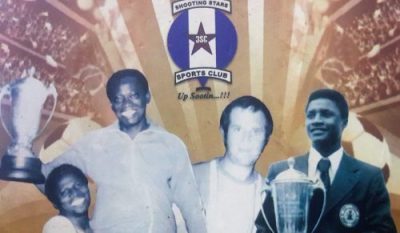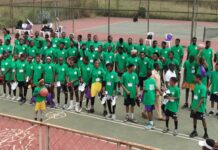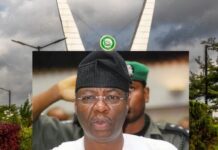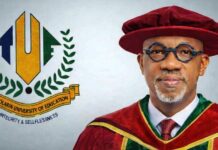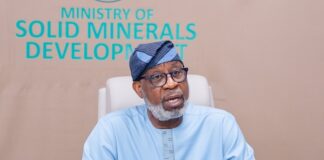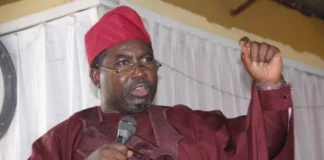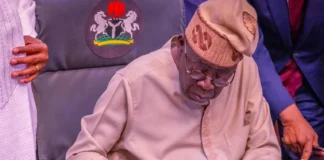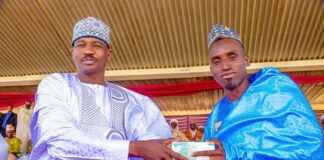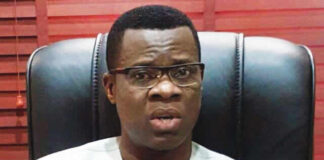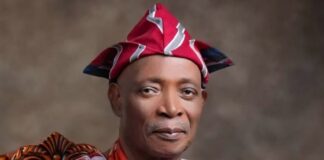Well, it may still seem like yesterday but the reality is that it has been 42 years since that eventful day in November of 1976, when Shooting Stars FC of Nigeria played against Tonnerre Kalala FC of Cameroun in the first leg semifinals of the Africa Cup Winners Cup in Ibadan and defeated the team led by the legendary Roger Miller by 4-1, to make the return leg in Yaoundé, Cameroun, a mere formality.
2018 must be the ‘fastest’ year in history. It has gone like a breeze. I can’t believe it is November already. Was it not yesterday that we had the New Year celebrations, and were looking far ahead as if December was a lifetime to go?
Here we are, the first midnight of 2019 already knocking on the door. Where did the whole of the year, from January till now go to?
Come to think of it, was it not also ‘yesterday’ that I was a young man, freshly minted at the Polytechnic, travelling immediately after my final exams to Europe for the first time in my life, on my way to go to my first Olympic Games that summer in Montreal, Canada, as a Youth Corper?
In December of that same year, I was actually also playing a very major role in the winning of Nigeria’s first continental football club trophy? In that single year, I went to the moon and back.
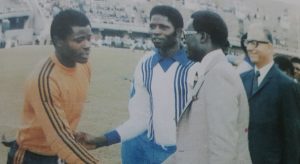
Well, it may still seem like yesterday but the reality is that it has been 42 years since that eventful day in November of 1976, when Shooting Stars FC of Nigeria played against Tonnerre Kalala FC of Cameroun in the first leg semifinals of the Africa Cup Winners Cup in Ibadan and defeated the team led by the legendary Roger Miller by 4-1, to make the return leg in Yaoundé, Cameroun, a mere formality.
Tonnerre Kalala won the second leg by 1-0, but that was surely just a small dent in our path to the biggest success Nigeria had recorded prior to that time in African club football.
How Time Flies
A reader wrote me this week and was asking about the whereabouts of all my colleagues in that 1976 Shooting Stars team. That got me thinking, hence today’s write-up, a tribute to some pioneers in the business of winning trophies for Nigeria.
Incidentally, I was in London last week.
For the first time in 40 years I spoke with the daughter of the British ‘missionary’ coach that led us in Shooting Stars FC to that sweet victory in 1976, Alan Hawkes.
Allan Hawkes was very instrumental to Shooting Stars’ success.
He is still alive, now about 82 years old, in relatively good health and ageing remarkably well in retirement.
He has just published a book on his six years’ experience working with Shooting Stars FC in Nigeria in the 1970s. The book is released on Amazon this past week, titled, ‘Up Coach…the story of a soccer missionary’.
A few weeks ago, Allan Hawkes contacted me via my Facebook page and requested to know the fate of all his ‘boys’ in Shooting Stars, players he had not had any contact within 40 years.
This approximates to what I sent him. He was aware that our leader and mentor, the heart and soul of Shooting Stars, Chief Olalekan Salami had passed on. The man who hired him from England, Chief Emiola Adesina, is still alive and lives in Ibadan
Of the three Nigerian coaches that worked with him, only one is still alive – Goalkeeper trainer, Amusa Adisa. The others, Joseph Ladipo aka Jossy lad and Rafiu Salami, have both passed on.
The squad had about 28 players but only 16 players actually played in one match or the other throughout the competition. The entire team scored a total of 16 goals, out of which Moses Otolorin scored eight, and I scored seven. I do not recall who scored the other single goal during the competition.
Of those that actually had a kick of the ball the following have passed on:
Best Ogedegbe (Bestila). He kept goal in most of the matches. He died in 2009 at 55 after working with the national junior teams of Nigeria for a few years.
Joe Appiah– Ghanaian, Right-full back, died in Ibadan in May 2012 at 62.
Samuel Ojebode – Captain and Left back. Played also for the national team for three years. He died in July 2012 at 68.
Dauda Adepoju– Centre Half. Quiet gentlemen, but as hard as steel. Very cerebral. Uncle to Mutiu Adepoju. He died in Ibadan a long time ago.
Mudashiru Babatunde Lawal (Shiru) MON, MFR – Attacking midfielder – Nigeria’s first soccer ambassador, Non-stop running, exceptionally skillful midfield player. He died in July 1991 at a very young age – 37.
Folorunsho Gambari (Gambus)– Defensive Midfielder. Extremely hard and hardworking defensive midfielder, reputed for his special marking tasks, including marking out Roger Miller in 1976. He died in 1981 at a very young age of around 32.
Moses Otolorin (Fantasia) – the man with the longest throws and the most powerful shots. He scored eight of the 16 goals the entire team scored in the 1976 African Club challenge. He died in December 2014 at 67.
Adekunle Awesu– Died mysteriously in 1994 in the USA at the age of 43. He was named the best left winger in Africa during the 1976 Africa Cup of Nations in Dire Dawa Ethiopia.
Abai Adeleye– Very quick, left winger. He died rather quietly. I am not sure of the year.
The following nine are still alive and doing relatively well.
Zion Ogunfeyimi (Omo oba) – In goal. Started the competition for a few of the matches. It was an injury and Best’s incredible form that year that kept Zion a bit quiet later on and on the bench. Otherwise he also was in the national team and in great shape.
Sam Ashante– Centre Half. Ghanaian. Very Stylish and intelligent player. He now lives in Accra, Ghana. He was a coach with the MTN academy in Accra for several years.
Sam Saka Abossey– Centre half. Ghanaian. Great Libero. He is married to a Nigerian woman and lives in Ghana.
Idowu Otubusen (Slow Poison)– Centre Half. Intelligent, calm, cool and calculative defender. Still lives in Ibadan.
Nathaniel Adewole (Commander) – Midfield general and dribbler extraordinaire. Greatest surprise is why he never played for the national team. Lives in Ibadan. He is a Rabbi and has remained unmarried all his life.
Phillip Boamah (Etu) – Dashing winger. One of the few Ghanaians to play for Nigeria’s Green Eagles. He lives with his Egba wife in Ibadan.
Segun Odegbami (Mathematical) – striker. Lives mostly in Abeokuta. Attempting to become the governor of Ogun State.
There were other players in the squad but that did not feature in the matches. A few that come to my mind are:
Kehinde Jeyifous – Defensive Midfield player. Lives in Ibadan; Segun Adelakun (Aya bi eyin) – Also nicknamed ‘Small Sheg’ by Allan Hawkes. Attacking winger. Lives in Akure; Rasaki Fadare (goalkeeper) late; Ismaila Bello (defender) lives in the U.S.; Kafaru Alabi (late); Olaide Ali (defender) Alive. I believe he is in the USA too; Anthony Osho (attacker).
He passed on a few years ago.
May those that have gone to sleep rest ever peacefully in the bosom of Our Creator, and those that are still alive be eternally grateful to the Creator, and enjoy the peace and comfort that life offers them for the rest of their time here on earth.
Culled from The Guardian NG

